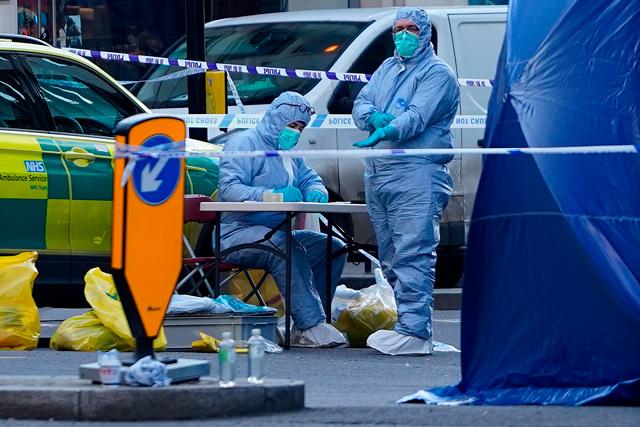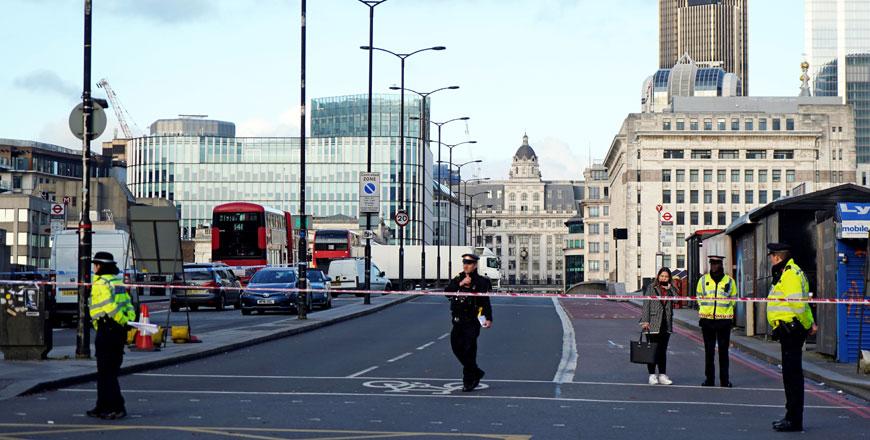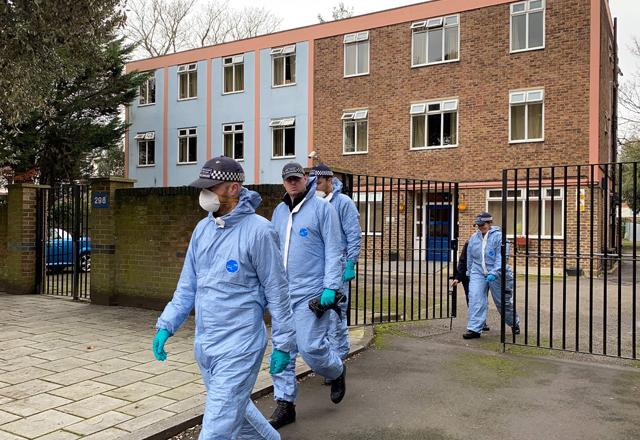You are here
UK's Johnson vows action as convicted terrorist named in London attack
By AFP - Nov 30,2019 - Last updated at Nov 30,2019

A forensics officer works outside a tent on Cannon Street near London Bridge in the City of London, on Saturday, following the November 29 terror incident on London Bridge (AFPphoto)
LONDON — Prime Minister Boris Johnson vowed Saturday to review Britain's sentencing system after a convicted terrorist released early from prison was suspected of stabbing two people to death in an attack around London Bridge.
Police shot and killed Usman Khan after his suspected assault that seriously injured three other people was broken up by bystanders — one armed with a 1.5-metre narwhal tusk and another a fire extinguisher.
Video footage of the confrontation showed Khan, 28, being challenged by a man, reportedly a Polish chef, wielding the tusk — believed to have been taken from a nearby historic hall — and sprayed with the extinguisher.
He had been conditionally released from jail last December after serving less than half of a 16-year prison sentence for terrorism, and was wearing a suspected fake explosive device.
Moments later armed police officers arrived on the scene and shot him dead.
Investigators have said they are not actively seeking others in relation to the incident, which recalled a three-man terrorist assault two years ago on London Bridge that killed eight.
The latest attack came less than two weeks before Britain's general election, and politicians temporarily suspended campaigning.
"It does not make sense for us as a society to be putting people who have been convicted of terrorist offences... out on early release", Johnson said as he visited the scene.
"We argue that people should serve the tariff, serve the term, of which they are sentenced," the prime minister added, noting the Conservatives' manifesto calls for a tougher sentencing regime.
‘Bundle him to the ground’
Khan, a British national from Stoke in central England, was handed an indeterminate sentence for public protection in 2012, with at least eight years in prison.
He was part of an eight-man network inspired by Al Qaeda who had plotted to bomb targets including the London Stock Exchange, and planned to take part in “terrorist training” in Pakistan.
But his sentence was quashed by the Court of Appeal in April 2013 and he received a new 21-year term, comprising a custodial sentence of 16 years and five years on conditional release.
Police on Saturday were reportedly searching a property in Stafford, in central England, thought to be connected to Khan.
Police believe he began the attack at Fishmonger’s Hall, a historic building said to contain many ancient artefacts on the north side of the bridge.
Khan was attending an event organised by the University of Cambridge’s criminology institute on prisoner rehabilitation, and reportedly arrived with two knives and the fake suicide vest.
The Metropolitan Police appealed for witnesses to come forward.
As the attack moved to London Bridge, a throng of people could be seen in videos grappling with Khan on a pedestrian walkway.
They reportedly included a convicted killer on day-release from prison and other ex-offenders also attending the criminology event.
Tour guide Stevie Hurst told BBC radio that “everyone was just on top of him trying to bundle him to the ground”.
“I saw that the knife was still in his hand so I just put a foot in to try and kick him in the head,” he said.
One man in a suit and tie — identified by media as a police officer — was later seen carrying a large knife away.
“As we saw the worst of human kind, we saw the very best of human spirit and London,” Met Commissioner Cressida Dick said on Saturday as she visited London Bridge.
‘Mistake’
On November 4, Britain downgraded its terrorism threat level from “severe”, the second-highest of five levels, to “substantial” — the lowest rating in more than five years.
Attention has swiftly turned to how Khan could have been released from prison after serving less than seven years of his sentence.
Inmates are usually released half-way through the type of determinate sentence he was given, and time spent in custody before trial may have been taken into account.
The Parole Board said it had no involvement in his release and that it appeared to have happened automatically as required by law.
During the attack, Khan wore an electronic tag used to monitor criminal offenders, The Times newspaper reported.
Johnson, who took over as prime minister in July, said the cases of other convicted terrorists released early were under urgent review.
“A great deal of work is being done right now to make sure that the public is protected,” he added.
Queen Elizabeth II said she and husband Prince Philip had been saddened to hear of the attack and expressed her “enduring thanks” to the “brave individuals who put their own lives at risk to selflessly help and protect others”.
The 2017 London Bridge attack involved Islamist extremists wearing fake suicide devices ploughing a van into pedestrians, before attacking people with knives in nearby Borough Market and being shot dead by police.
Related Articles
LONDON — A man suspected of stabbing two people to death in a terror attack on London Bridge was an ex-prisoner convicted of terrorism offen
LONDON — British police were searching two homes on Monday after shooting dead an extremist who knifed two people in London in an attack cla
LONDON — British police on Sunday shot dead a man in south London, after at least two people were stabbed in a “terrorist-related” incident.


















